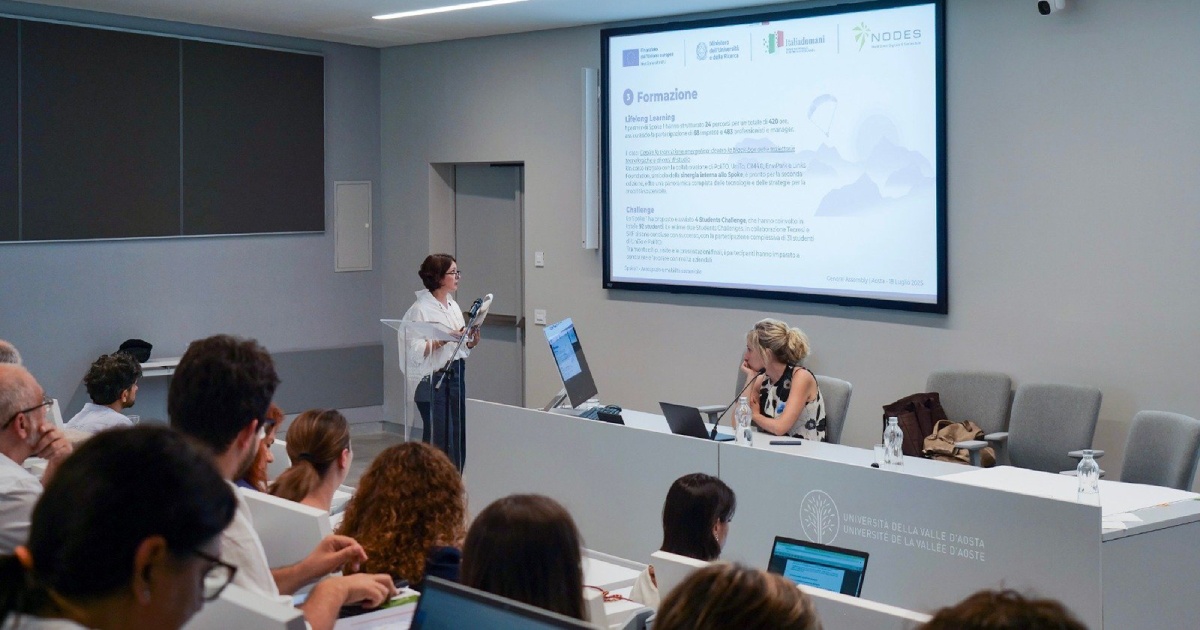On July 18, 2025, the NODES – North-West Digital and Sustainable Innovation Ecosystem gathered in Aosta for its sixth General Assembly, hosted at the new Campus of the University of Valle d’Aosta (UniVdA).
It was an intense, well-attended day that placed shared assessment front and center: taking stock of results achieved, examining the first evidence of impact, and charting the horizon of activities between now and the Program’s conclusion at the end of the year.
With total participation exceeding 110 people, 85 onsite and about 25 online, the day marked an important opportunity for broad-based dialogue across the entire NODES network.
Current status and overall vision
General Director Chiara L. G. Ferroni guided the session with a clear snapshot of project progress and the results achieved to date.
Among the many figures highlighted, one stands out: against a reporting target of €74.2 million (by April 2025), the Ecosystem recorded €75.2 million, surpassing the planned objective and earning a positive assessment from ETS and the Ministry of Universities and Research (MUR).
Enterprise Project performance highlights:
- €43 million reported by the winners of the Cascade Calls (representing 81% of expected progress), with 224 funded companies across 183 projects;
- €18.6 million already disbursed following completed audits/checks;
- a balanced distribution of funds across Line A, Line A Mezzogiorno, and Line B.
The milestone on interim monitoring and operational impact has also been met, paving the way toward achievement of the end-of-september milestone.
Impact Focus: a qualitative reflection
During the morning, the Impact Task Force, with contributions from Antonella Frisiello and Federica Carella of LINKS Foundation, presented an in-depth qualitative evaluation of the transformations triggered by the Ecosystem across organizational and territorial contexts. The analysis underscores how NODES has set in motion a deep, distributed change, creating the conditions for a transformative impact that can extend beyond the project’s formal duration.
The study involved around thirty participants including managers, technical staff, and the leads of the Spokes and HUB, using a qualitative methodology based on group interviews and thematic analysis.
Five dimensions explored:
- Organization – Emergence of shared operating models, leaner governance, and innovative tools, with the HUB acting as system facilitator and coordinator.
- Collaboration – Strengthening of internal and external relationships, with the activation of the Stakeholders Committee as a dynamic co-design space.
- Skills – Co-designed training pathways, student challenges, and new learning experiences tied to innovation across territories.
- Communication & Dissemination – Hybridized languages, multi-target strategies, and new engagement tools for companies and local communities.
- Valorization – Emergence of new value chains, investor contacts, scalability instruments, and the construction of a territorial innovation pipeline.
Progress update: voices from the Spokes
In the afternoon plenary, the seven Spokes presented summaries of their activities and key results, offering a rich and multi-layered picture of overall progress.
- Spoke 1 – Aerospace & Sustainable Mobility
Sabrina Corpino (PoliTo) highlighted the strengthening of international networks, active academic Proofs of Concept (e.g., RoboAPP), and the creation of the ASTRO start-up, supported by I3P. Flagship initiatives include N-SMART, V2X, and H2Mobility. Coming soon: the Charging Lab and Space4You platform.
- Spoke 2 – Green Technologies & Sustainable Industry
Nicole Mariotti (UniTo) reported 99 publications, 28 deliverables, 24 innovation projects, and 17 lifelong learning (LLL) pathways. A busy semester of events is planned in collaboration with Envipark, Proplast, and the European Commission’s Joint Research Center.
- Spoke 3 – Tourism & Culture Industry
Barbara Pozzo (Uninsubria) presented the TOEP platform, the Detours project, and immersive labs in Biella, also emphasizing strong connections with industry and international partners. Three student challenges are active, and a new spin-off has been launched.
- Spoke 4 – Digital & Sustainable Mountain
Alberto Gaggero (UniVdA) showcased prototypes and publications within the flagship projects SUMMER, SMARTWEST, and INTERFACE. The Digital Twin platform is active, with additional focus areas including smart working, environmental risk, mobility, and territorial valorization.
- Spoke 5 – Health Industry & Silver Economy
Marco Invernizzi (UPO) reported 95+ B2B meetings, 32 courses, and nearly 900 participants. The TINCARE and INNDIANA projects are in clinical trial/pilot phases. The aim is to integrate innovative models into the National Health Service.
- Spoke 6 – Primary Agri-Industry
Hermes Giberti (UniPv) noted, for the VINO Flagship, two prototypes and a new spin-off, along with 11 R&D projects, 5 academic PoCs, and 100+ students involved. Acceleration programs are advancing in partnership with ComoNext.
- Spoke 7 – Secondary Agri-Industry
Nazarena Cela (UniSG) highlighted 56 publications, 150,000+ digital interactions, and 25 industrial projects. The “0to1 Acceleration Sprint” is underway, alongside initiatives to valorize food by-products within a circular-economy framework.
The reporting session confirmed the vitality and maturity of the NODES system, thanks also to:
- 400+ outputs generated across publications, prototypes, patents, spin-offs, events, and digital tools;
- growing impact on production and territorial value chains;
- expanding inter-Spoke collaborations;
- an increasingly solid, shared strategy for visibility and internationalization.
The Program’s final phase will be decisive in capitalizing on the results achieved and ensuring an effective transition toward new project and strategic trajectories.
Next steps & key deadlines
In closing, General Director Ferroni outlined for the NODES network the operational actions and major deadlines scheduled for the second half of 2025, with specific references to the various Work Packages, Southern Italy (Mezzogiorno) Partners, and Academic PoCs.
It promises to be a crucial period, with numerous operational meetings and key appointments ahead. Among the highlights: Researchers’ Night (La Notte della Ricerca) events, the Startup Prize, and a series of valorization meetings scheduled for October.
The calendar concludes with the final event, “Last dance,” planned before year-end—a symbolic moment that will mark the formal closure of the NODES Program, still under tight wraps.

